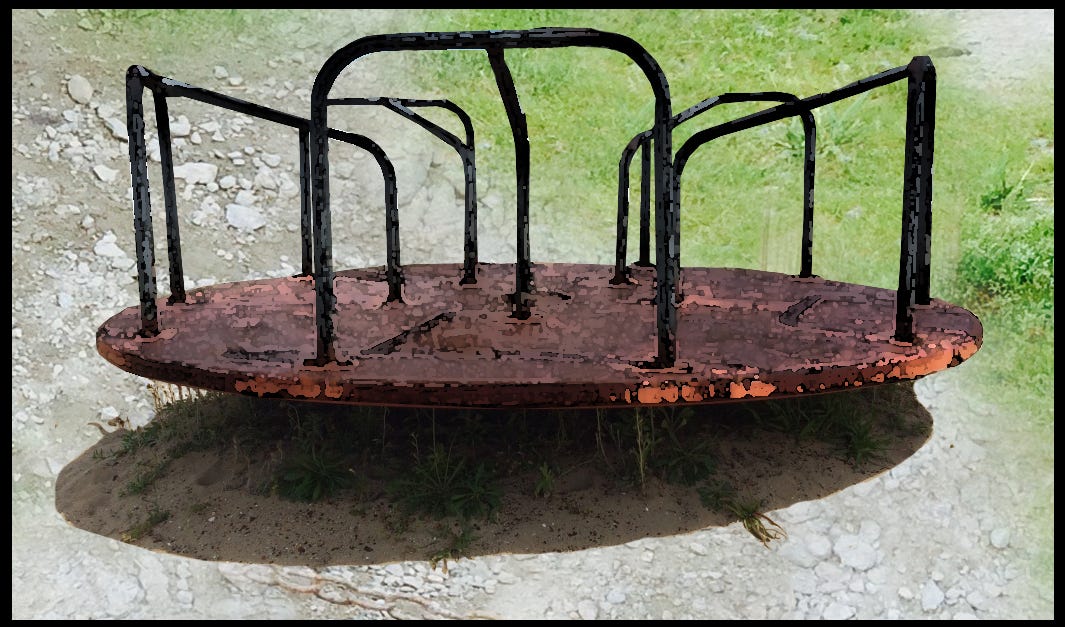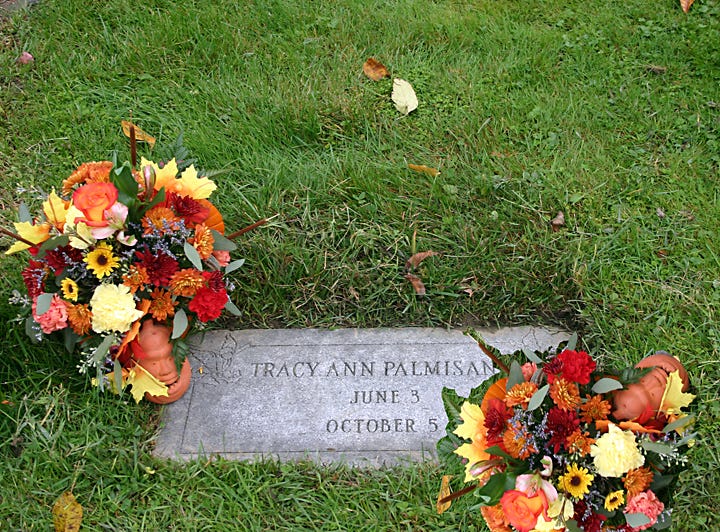"The world is full of magical things waiting for our minds to grow sharper." Bertrand Russell
October 1988
Psychic Jen lived in a crappy trailer in crappy East Montpelier in the crappy backwoods of Vermont. Everyone at the university—even the professors—went to her. Plagued by nightmares and curious, I caved and phoned Jean. "Yes," she told me. "Come today. 12:30." She hung up. Immediately I regretted it.
My friend Mary believes in that stuff but I don’t. Still, last night's dream made me drop my guard. Fall always brought nightmares so when the anniversary of Tracy’s accident approached, the dreams got worse. I don't know what I expected from Jean. And I'm not entirely sure why I was afraid—maybe that her place would look creepy or she'd have me drink something foul. Mary assured me Psychic Jean was just a regular old lady who lived with a cat.
The drive to East Montpelier took me by Hope Cemetery. I felt a pang because so much time had gone by since I last visited. My grandmother used to bless herself whenever we passed a graveyard. I smothered the indoctrinated Catholic girl's urge to make the sign of the cross and raced by Hope.
I approached Lincoln Elementary School, the one Tracy might have attended and my stomach knotted. Jump-suited girls screamed as they spun the roundabout—that twirly thing kids call a merry-go-round. There was one in the park near where we’d lived years ago. I recalled sitting on it, holding my twenty-pound child. I'd stuck out a leg and pushed us around and around while I sang Yes's "Roundabout." Tracy reached for my mouth, something she did when I sang—I was never certain if she was playing or wanting me to stop. I kissed her palm, then each of her tiny fingers. It's one of the last things I remember. Funny the moments we recall.
I sped up, not allowing myself to check if any of the kids resembled her. I let out a breath as the shadow of Lincoln Elementary School disappeared in my rear-view mirror.
I knocked on the doublewide trailer and someone hollered to come in. Psychic Jean was sunk deep into a Barcalounger reading a Bible. She was probably fifty. Maybe sixty. She wore orange cargo pants and a pink angora sweater—crocheted by someone who didn’t know what they were doing. The combination hurt my eyes. A granny-square afghan mostly covered the pants.
Jean closed her Bible, threw off the afghan and pushed herself up. Both she and the chair sighed as an ugly calico cat dashed out from behind. As Jean led me into her kitchen I scanned the room. Everything seemed perfectly normal; there was a gingham teapot with tea bags strings hanging out from under the lid and a half-eaten cake with "Happy Birt" drawn on top in Halloween swirls.
As I sat at Jean's Formica table, she placed her Bible between us. "I invite you to open the Bible and read something,” is what she said. Mary had told me about this, and we figured it was Jean's roundabout way of determining if visitors were possessed, evil or nuts.
I reached for the Bible. A tiny part of me worried that it—or I—would burst into flames. The book fell open on a passage in Chronicles—the one where God grants Solomon wisdom. I read aloud then closed the Bible.
Jean asked about my kids. I wondered why she was asking the questions. I told her about my high schooler who didn't love her place in the world, and about my youngest who was innocent enough to still like me.
Jean peered through her John Lennon spectacles. "And...?" Jean planted her elbows on the chipped Formica. She cupped her hands and rested her chin on them.
I ignored her question and babbled about my job at University, asking if I should quit and find something else.
Jean seemed to stare through me, then asked, "What do you think?"
I closed my eyes, then opened them and asked if my daughters were going to be okay.
“How do you mean okay?"
Some damn psychic, I thought. I pushed myself away from her table. I'd wasted enough time in her doublewide and spent half my lunch hour trying to find it.
Jean glanced to my right, then asked who I’d brought with me.
I almost turned my head, but stopped, refusing to play her game. I opened my purse and rummaged for some money.
Jean took off her specs, shifted her body and leaned to peer into a spot a foot away from me. "And what might your name be, Sweetie?" she asked. She nodded as though listening to someone she couldn't possibly have known about. After a bit, Jean straightened and turned back to me. "She's sad."
I caught my breath because for a second I believed her and my arms ached. I instinctively hugged myself, then came to my senses. I set a twenty-dollar bill next to the Bible and thanked Jean for her time. When I turned to leave, I was terrified to even glance at the space of air Jean had spoken in to.
As I opened her door, Jean said, "She's sad because you are.”
I took a circuitous route back to work. It made me late but I couldn't face the cemetery or the memory of that long ago October day.
June 1990.
I never returned to Psychic Jean and mostly forgot about sitting in the kitchen of her trailer—until today when I passed a rusty old roundabout. I detoured and drove toward Hope Cemetery, then pulled off onto the gravel that led into it. I stared up at the hill to where the granite marker lay near the edge of one of the cemetery’s roundabout curves. Tracy’s birthday was around the corner. I made the sign of the cross then shifted the Pinto into gear as it sputtered up the hill into Hope.
“Roundabout” was originally published in Writing in Community, the 2022 edition of London Writers’ Salon Anthology.








This literally took my breath away.
this is powerful stuff, CJ. And sad, of course.